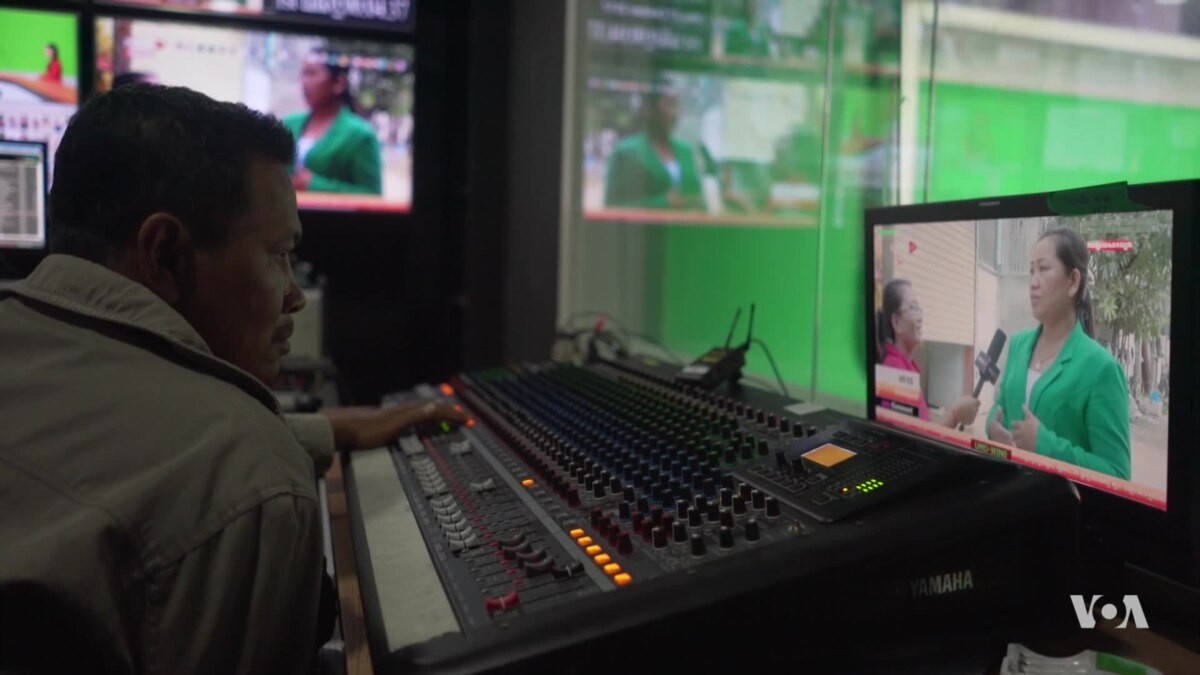
Life is good at NICE TV.
Staff enjoy generous benefits at the new Chinese network and their flashy building, directly inside Cambodia’s Ministry of Interior, boasts an elegant restaurant on the fifth floor with 360 degree views of the city’s political heartland.
News manager Seang Sophorn is busy directing from the control room as reporter Khoun Leakana, formerly of The Phnom Penh Post, beams in live from the scene of a reeking chicken processing factory that has residents up in arms.
“We are journalists so we are like the bridge to make the government aware of people’s needs or also to bring what government needs from people,” said Sophorn, who cut her teeth as a reporter at Radio Free Asia before a stint at the PNN network of ruling party Senator Ly Yong Phat.
Ministry of Interior
The news menu includes stories about preparations for the upcoming water festival and the types of stories NICE TV producers say are their standard fare: residential complaints about floods and traffic.
The key to NICE TV’s “bridge to the people” is an app the company has developed called Tutu Live, which allows viewers to beam themselves into the program, the television equivalent of talk-back radio.
Through it they are pushing user-generated content from their currently small audience, including NICE TV’s partners at the Ministry of Interior.
“The ministry has a police network all around Cambodia so we want to create social news and we can use this resource to create the best social news in Cambodia,” Nice TV Chief Operations Officer Jason Liu told VOA, speaking through an interpreter.
Limit the scope of media?
Others are less optimistic about the partnership.
This type of partnership between a foreign firm and a ministry responsible for Cambodian state security looked “not good” said Nop Vy, acting head of the media conservator the Cambodian Center for Independent Media.
“The image of the location in the ministry itself and the work of the private company interferes into the work of the ministry and [the] Ministry of Interior’s role is very important,” he said.
“So we just thought that so through this support it will limit the scope of the media team working at their station because they will [be] working under the internal policy of the TV station and the policy I know that it maybe say something for example not doing something against China,” he added.
Certain topics avoided
Despite their close relationship with the ministry, which holds an unspecified but apparently small share in the venture, Sophorn and Lui insist they are free to report whatever they want.
For Lui, the fact that the station tends to avoid sensitive political stories or opposition perspectives is more indicative of viewer appetites than any state enforced restriction.
“The role of TV is to make people’s living better, it is not to make conflict,” he said.
But a casual chat with some of the producers at the network suggests it is well understood that anything that could provoke the ruling Cambodian People’s Party is not to be touched.
Traditional journalism gone
Meanwhile their opportunities to do traditional journalism are evaporating as government critical news organizations fall one after another under increasing government pressure on the free press.
Gone are The Cambodian Daily, an obstinate dissenter for more than two decades, the broadcasts of Radio Free Asia and more than 30 radio frequencies that relayed their own shows as well as those of others, including Voice of America. Rumors that The Phnom Penh Post will soon be shuttered are swirling, but persistently denied by the bilingual paper.
In this void, outfits more in line with the Chinese model of media-state relations are on the verge of taking over the press entirely in Cambodia.
In an interview with VOA, Huy Vannak, an under-secretary of state at the Ministry of Interior, suggested that though the content at NICE TV will predominantly focus on entertainment, the station will also work “to inform the people about how to enforce the better public service.”
“That’s the purpose to have the TV because the ministry is run and has a big task to the people basically at the grass-roots level because we have the police department on the security side and we have the public service on the administration side,” he said.
VOA has sought to clarify the ministry’s relationship with NICE TV, but after months of efforts no comment has been forthcoming.
Liu conceded it was unusual for a foreign company to hold such a partnership with a government ministry. But he stressed NICE TV was an entirely private operation that has simply been the beneficiary of blossoming relations between Cambodia and China.
“Because we come from private enterprise so the Cambodian government allow us to come and invest on the media sector, but if we come from Chinese government the Cambodian government I think they will not allow us to come and invest in the media sector,” he said.
He refused to comment on the record about whether the Chinese government held any influence over the station.
Reporter Sun Narin in Washington contributed to this report.
Read More Cambodia’s Nice New TV Channel from China : https://ift.tt/2JaRPvT
No comments:
Post a Comment